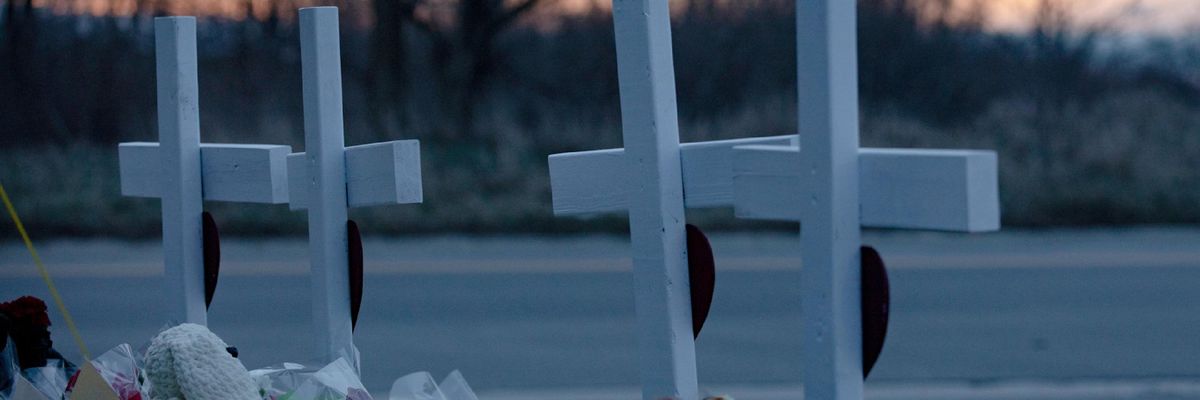Four students dead, six more, plus a teacher, wounded. Can you believe--another mass shooting last week. This one north of Detroit, at Oxford High School. A 15-year-old boy--and his parents--were arrested.
We're not afraid to wage war; we're not afraid to kill. But we're afraid of change.
While the shock and collective horror are still fresh, before the news cycle moves on, a question resonates with every heartbeat. It's always the same one: Why? Why? Why?
Partial answers abound. Mostly, we keep them to ourselves. Nothing changes. The accused killer, Ethan Crumbley, has been charged as an adult for murder. . .and terrorism. So what? Should we call in drone strikes on Oakland County? Bureaucratic "justice" is not going to keep us safe, any more than endless war has kept us safe.
This latest massacre--this shattering of young lives, of collective trust and community--is one more revelation that something is profoundly wrong in the world's most powerful nation, that we aren't safe, that a deep social wound remains unaddressed. We are left on our own to ask "why?"
Why were Mom and Dad, who gave their boy a 9mm semiautomatic handgun as an early Christmas present (four days before the shooting), so absolutely clueless about his intention to use it, even though, as AP reported, the night before the shooting, he actually "records a video in which he discusses killing students."
Perhaps even more eerily, why, on the day of the shooting, did no one grasp that he had a gun with him, along with three 15-round magazines? That morning, a teacher found a note on his desk that was so alarming she sent him to the school counselor. He had drawn a picture of a handgun and a wounded guy bleeding and written: "The thoughts won't stop. Help me." He was in the counselor's office for an hour and a half; his parents were summoned. They were told he needed counseling. They were also asked to take him home. They refused. They went back to work and the boy--whose responses to his questioning had seemed calm and reasonable--went back to the classroom.
As I say, amid all this, his Christmas present gun (which had been kept unlocked in a drawer in his parents' bedroom) remained stashed and unseen, presumably in his backpack. Shortly before 1 p.m., he stepped out of the school bathroom and started firing in the hallway, killing and wounding his classmates.
He was arrested. Four days later, his parents, who fled and hid, were found and arrested. And the justice system took over, raising another enormous "why?" Why is the American sense of justice simply linear and bureaucratic? Why is priority number one, in the wake of such a crime--a crime against humanity--to charge, convict and punish, rather than heal, understand and change?
This is not a simple event, especially considering that mass shootings, indeed, violent acts of all sorts, happen with stunning regularity. Why, then, do we respond, in an official sense, so simplistically? Charging the 15-year-old as an adult, "expanding" the nature of his charge from murder to terrorism, may intensify the official condemnation of his actions and further isolate him from the rest of us as a bad, bad human being, but we all know that, socially speaking, it changes nothing. (A potential future mass murderer probably won't rethink what he's about to do because he could we charged with terrorism, not just murder.)
I note all this in the wake of the U.S. House passage of a $778 billion defense budget, signaling the government's annual acknowledgement that we kill our enemies and that's that. No further questions will be taken.
Rupert Ross, in his book Returning to the Teachings, examines indigenous approaches to justice around the world: "The purpose is healing, not punishment--a healing accomplished by the full range of people who were affected by the original event."
This is the core of Restorative Justice, something I have written about a great deal in my columns, and something I deeply believe in. When harm has been done, people affected by it sit in a circle with one another, in a state of vibrant equality. They talk, and mostly they listen. "One deeper intent," Ross writes, "is to help people see others as complex, many-sided and 'whole' creatures--not just as 'offenders' or 'victims.'"
This kind of listening--this reach for awareness and understanding--is the core of social evolution. Presently we're stuck with a bureaucratic judicial system that simplifies people and their actions and attempts to judge, and punish, them in isolation. No matter that everyone acts in social context--including mass murderers.
What I fear is that, socially speaking, we're afraid of change. We're not afraid to wage war; we're not afraid to kill. But we're afraid of change. Every time I hear a national leader speak of "keeping Americans safe," I feel overwhelmed by the irony in those words. Usually such words address some aspect of the endless war we're waging, and usually they evoke the Wild West of film and legend, America's deepest font of mythology, where justice, you know, comes from the barrel of a revolver, or nowadays, from the strike of a drone. Violence is violence.
Four students dead, six more, plus a teacher, wounded.

